The results are in: Mayor Steve Rotheram hails success of Eurovision as report reveals £54m economic boost to city region
Watch the accessible version here
- 473,000 people attended Eurovision events
- 306,000 additional visitors
- 250,000 people attended Eurovision Village at Pier Head
- Mayor Rotheram: ‘We gave millions of people a Eurovision they will never forget’
Mayor Steve Rotheram today hailed Eurovision’s ‘vital shot in the arm’ for the Liverpool City Region economy as a new report revealed the event delivered a £54m boost.
In a first for any Eurovision Song Contest host city, five in-depth independent evaluations were commissioned – the interim results of which were announced today by Liverpool City Region’s Mayor Rotheram and Leader of Liverpool City Council, Councillor Liam Robinson.
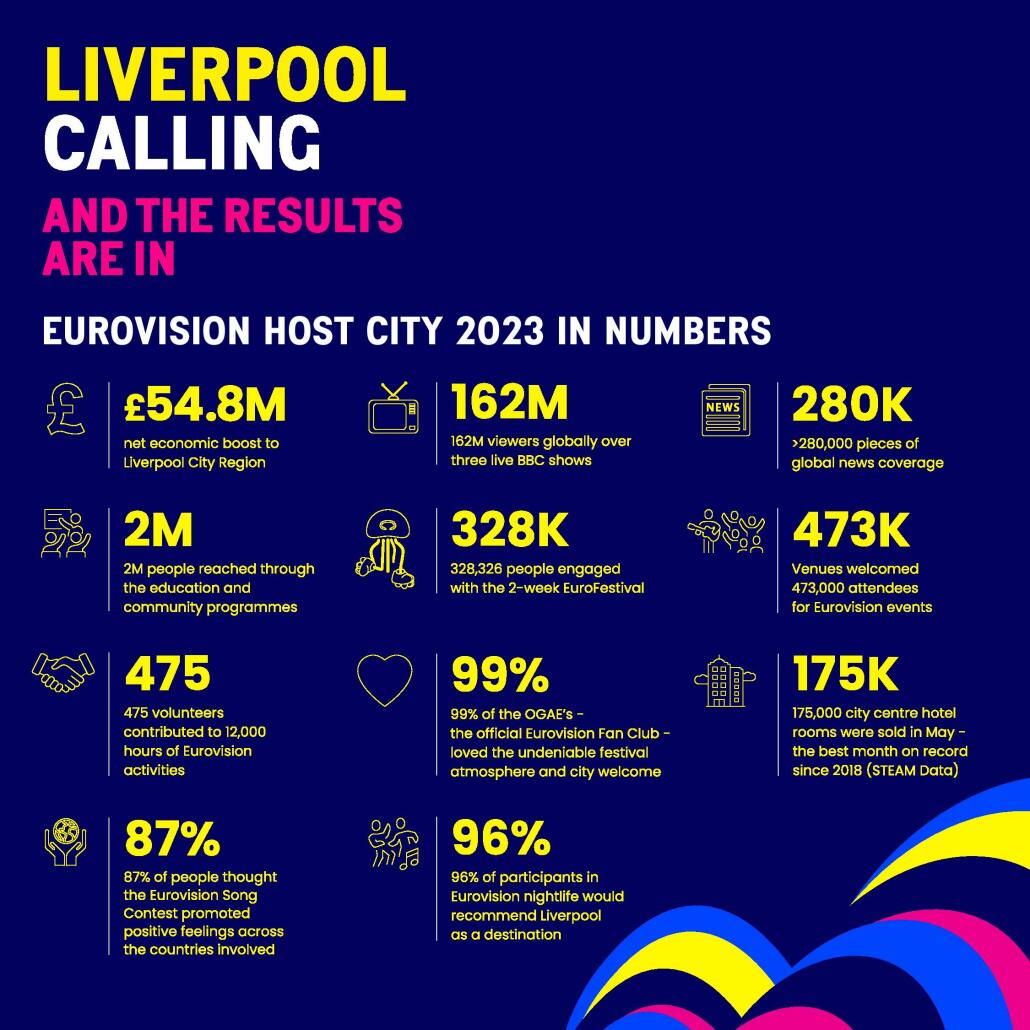
The reports looked at the economic and social impact of staging the event on behalf of Ukraine, as well as the influence on cultural relations; the impact on wellbeing in the city and the wider city region; the visitor experience and the effectiveness of the strategic collaboration between delivery agencies.
Key data highlights include:
The Big Numbers
- Eurovision boosted the Liverpool City Region economy by £54.8million (net) with restaurants, accommodation providers, shops, bars and transport networks all benefitting.
- In total 473,000 people attended Eurovision events in the city, with 306,000 additional visitors heading to Liverpool to be part of the celebrations.
- In May, 175,000 city centre hotel rooms were sold – the best month on record since 2018. (STEAM data)
Culture Counts
- The education and community programmes, EuroStreet and EuroLearn, engaged with 367 organisations and directly with 50,000 people, young and old. The overall programme is estimated to have reached 2 million people.
- EuroFestival – the Culture Liverpool curated two-week culture festival – presented 24 brand new commissions, 19 of which were in collaboration with Ukrainian artists. A huge 328,346 people engaged with this programme – 557 artists, 1,750 participants involved in a commission and an audience number of 326,039.
- The official Eurovision Village, located at the Pier Head attracted 250,000 visitors across the 10 days it was open, with the ticketed final selling out within hours.
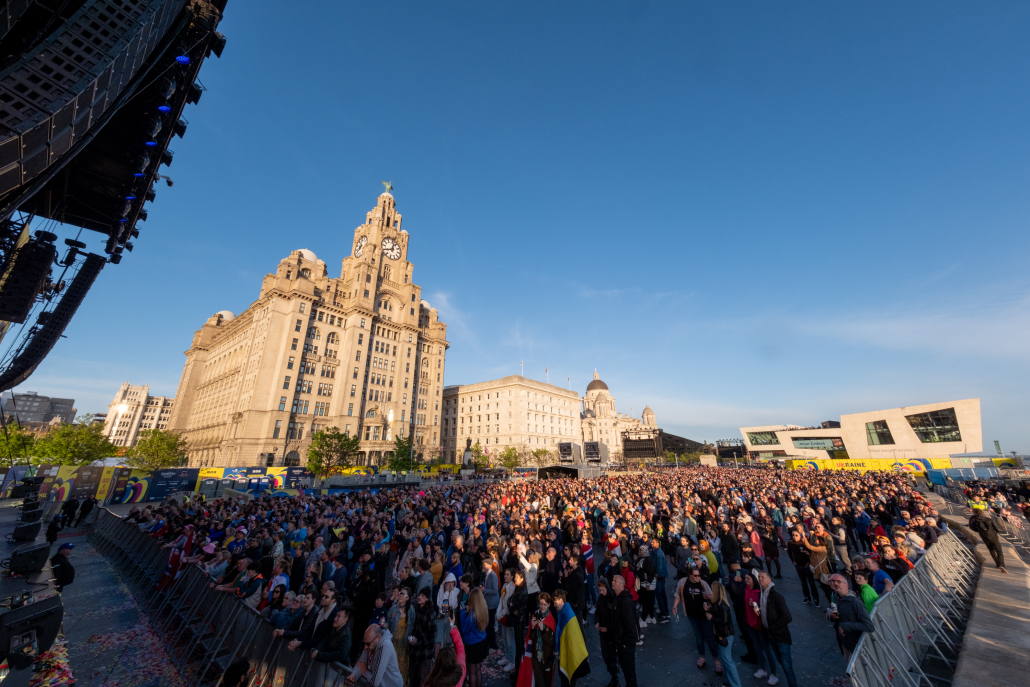
Eurovision village at the Pier Head
Visitor’s Views
- Visitors to Liverpool reported an overwhelmingly positive experience. In a survey, 89% of those questioned, felt it was a safe event and 88% praised its inclusivity. A whopping 96 per cent of those surveyed would recommend Liverpool as a destination to visit and 42% of overseas visitors said the city’s staging of the event had a positive impact on how they viewed the UK.
- The official Eurovision Fan Club – the OGAEs – carried out a survey and found that 99% of their members felt welcomed in the city and 98% loved the undeniable festival atmosphere.
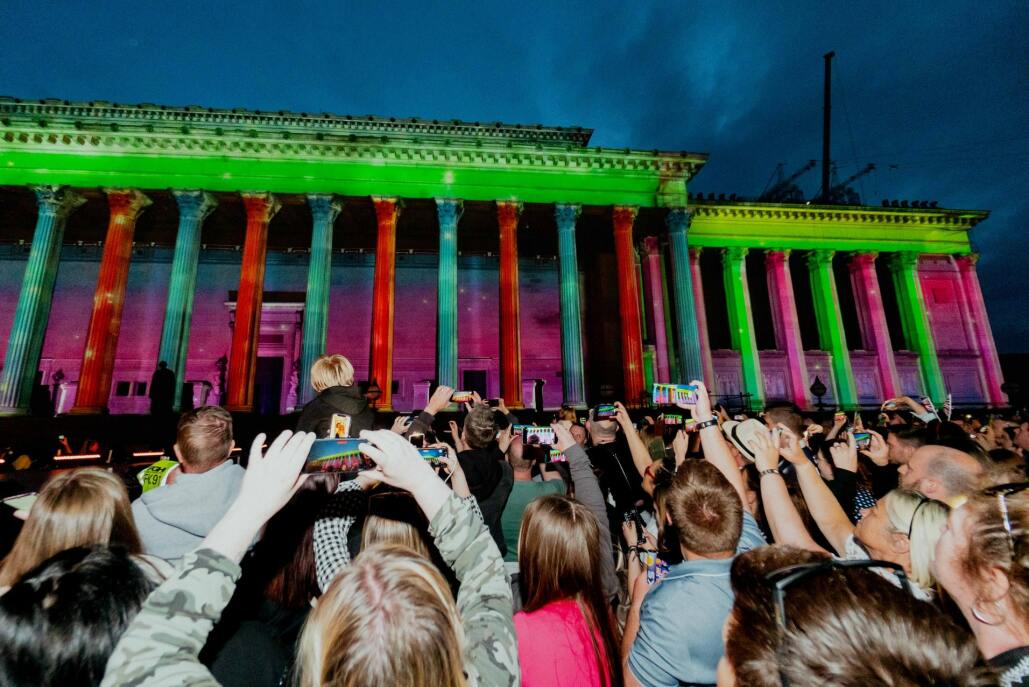
Resident’s Reaction
- There was a huge amount of pride around Liverpool being the host city, with 80% of residents noting how important it was for Liverpool and a further 93% saying they were pleased with how the city delivered the event.
- Of those questioned, 74% were enthusiastic about Liverpool hosting on behalf of Ukraine and 71% felt that the city’s leading role promoted positive feelings across all of the participating nations.
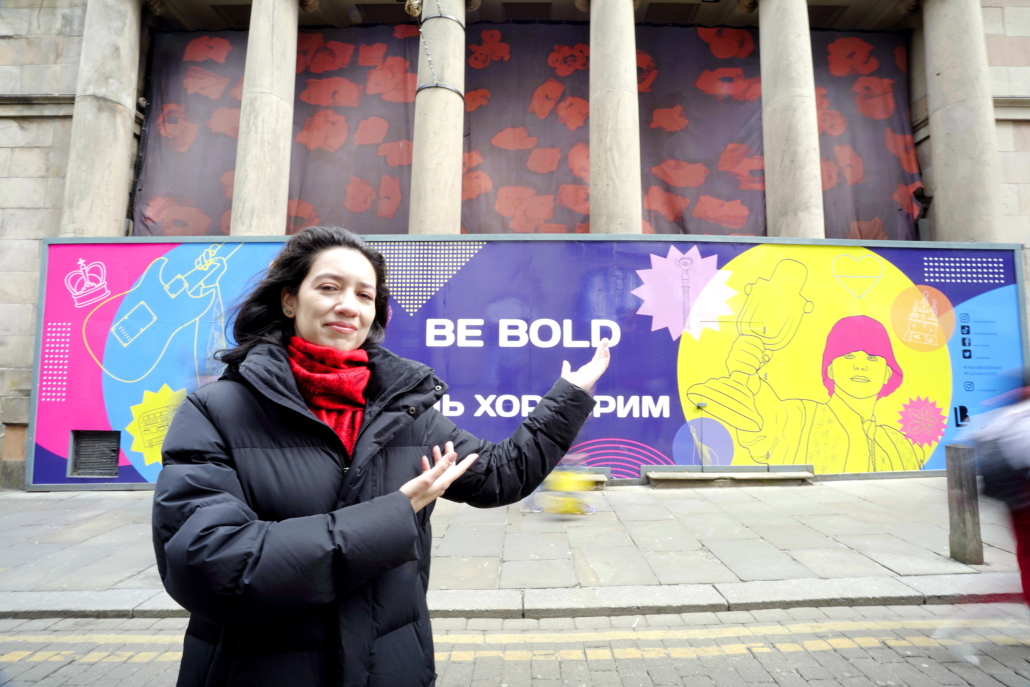
Ukrainian Mariana Potetenko in front of her Eurovision artwork on the Lyceum building, Bold Street, Liverpool
People Power
- An impressive 475 people provided 12,000 hours of volunteering, covering 350 shifts. The majority (90%) were from the North West of England, and 30 were Ukrainian.
- A Eurovision job recruitment fair saw 394 jobs offered in one day.
- A partnership between the BBC and Liverpool Institute for Performing Arts saw 145 students become part of the Eurovision production – in roles such as on stage dancers in the live shows, costume makers or in the TV production team.
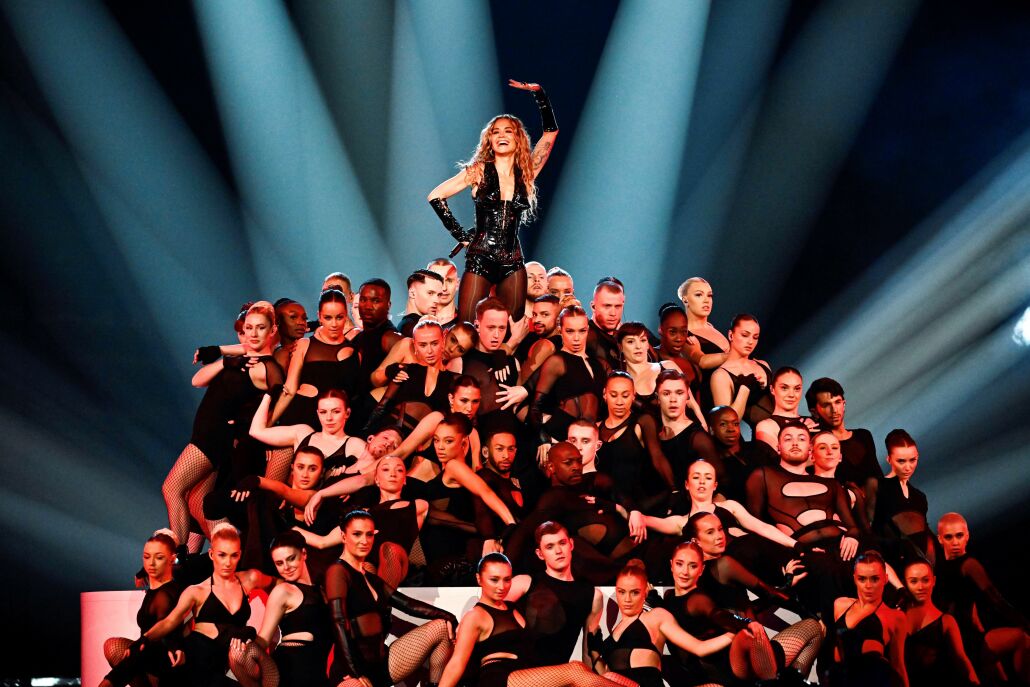
Read all about it
- Between the period of October 2022, when Liverpool was announced as host city, until end of May 2023, more than 280,000 pieces of global news coverage were generated.
- The three live BBC shows were watched by 162 million

Eurovision 2023 BBC presenter – Graham Norton.
Keep Liverpool Tidy
- More than 50,000 tonnes of waste were collected throughout the Eurovision period, 80% of which could be recycled.
Liverpool City Region Mayor Steve Rotheram said:
“There was never a doubt in my mind as to whether our region was up to the challenge of hosting a global spectacle like Eurovision on behalf of our friends in Ukraine – because nowhere does culture bigger or better than the Liverpool City Region.
“From the hundreds of thousands of visitors who flocked to our region for a fortnight of fun and frivolity, to the tens of millions around the world who tuned in, we gave millions of people a Eurovision they will never forget.
“While that’s an incredible result in itself, the contest was also a vital shot in the arm for our local economy, bringing in more than £54m, creating thousands of jobs and opportunities for local people and showcasing our brand to an international audience.
“None of this would have been possible without the hard work of everyone who truly embraced the Eurovision spirit and made our visitors feel so welcome. I said all along that nowhere can throw a party quite like us – and now we have the results to prove it!”
Leader of Liverpool City Council, Councillor Liam Robinson, said:
“The whirlwind that was Eurovision, gave this city an unparalleled stage where it could showcase not just its organisational prowess, but also its heart and soul.
“From the outset, we put plans in place to evaluate everything we programmed in order to have a thorough understanding of the impact of major events.
“The visitor and economic figures speak for themselves – jobs were created, local businesses were on the receiving end of a much-needed boost and hundreds of thousands of people came to the city, had a great time and are more than likely to return again.
“My mantra is proud but never satisfied. These comprehensive reports give us the opportunity to reflect on what was achieved over an incredibly short period of time, but more importantly we can look at lessons learnt for the next time we host a major event. And this is Liverpool, so there will definitely be a next time.
“Knowing the financials and the visitor numbers is always a great indicator of success, but with Eurovision we wanted to do more. As the first host city ever to introduce a school and community programme dedicated to Eurovision, we needed to drill into what that really meant for people – did it make a positive difference to their lives and as a result to our city? Never before has any other location commissioned such a detailed analysis, and it goes without saying that our methodology can be adopted by locations across the world which is a real badge of honour for Liverpool.
“This collective research proves that events like Eurovision can transcend boundaries, leaving a legacy of inspiration and goodwill. It was a milestone moment in our city’s history, and now we’re more than ready for the next one.”
The independent reports were:
- Economic Impact – Commissioned by Liverpool City Region Combined Authority and funded by Arts and Humanities Research Council. The research was compiled by AMION Consulting.
- Community and Wellbeing – Commissioned by Liverpool City Council and funded by Spirit of 2012 and the Department of Culture, Media and Sport (DCMS). The research was carried out by University of Liverpool.
- Cultural Diplomacy – Commissioned by Liverpool City Council and funded by British Council and DCMS. The British Council led on the research along with the University of Hull, and consultants from Universities of Brighton, Southampton and Royal Holloway (University of London).
- Nightlife – Funded and compiled by Liverpool John Moores University.
- Multi–Agency Working – Led by Edge Hill University.
Along with these reports, the BBC has commissioned its own post-show report.
To bring together the findings of the reports, Liverpool City Council’s Public Health team commissioned The Heseltine Institute for Public Policy, Practice and Place to compile the headline findings. This comprehensive overview can be found at the Heseltine Institute website.
The interim findings of these reports were discussed at a special one-day Eurovision event at ACC Liverpool today.
Liverpool’s Director of Culture, Claire McColgan CBE, said:
“We experienced this Eurovision-high as a result of cultural back catalogue.
“We have spent years working towards what we all experienced in May – we cut our teeth during our European Capital of Culture year and from that point we have grown exponentially in confidence and ability as year-on-year we continue to deliver events that rival any other on the world stage.
“The pandemic was a real line in the sand for us, and undoubtedly Liverpool’s role in leading the charge on the reopening of venues nationwide made us stand out from the crowd – we are recognised as a city that can deliver unforgettable moments, safely, quickly and with a scouse panache that simply can’t be replicated anywhere else.
“Quite simply, it was an honour to deliver Eurovision on behalf of Ukraine and the UK. I’ve never known time move so fast as it did across those seven months and it has been a real pleasure to digest these impact reports and relive the experience once again and reassure myself it wasn’t just a crazy dream! They underline the fact Liverpool has the skill, agency-wide teamwork and the creativity to deliver time and time again.
“So, I’d like to say to everyone – whether you worked on the event, donned those iconic yellow hoodies and volunteered, performed on stage or on our streets, danced at the Village, sang along at the arena or perhaps you discovered more about Ukraine in the classroom or even helped evaluate the event – thank you. You made Eurovision. Liverpool made Eurovision. We were all united by music.”
Eurovision Minister Stuart Andrew said:
“It is fantastic to see the impact that hosting the Eurovision Song Contest has had on Liverpool. The city put on a fantastic display of culture and creativity, showing solidarity with our friends in Ukraine and highlighting what unites us all.
“This research demonstrates the positive impact of hosting major events and I hope that we can continue to build on this success.”
Latest News
Combined Authority approves major funding boost for Salt and Tar – just months after success of Tom Jones and Status Quo concerts
Mersey Tunnels to introduce faster tap and go payment system
Mayor Steve Rotheram to lead Combined Authority meeting in Runcorn for the first time – after pledge to take democracy into communities
Culture Chief takes on city region role
Removal of landing stage and linkspan at Woodside makes for eye-catching riverside sight
